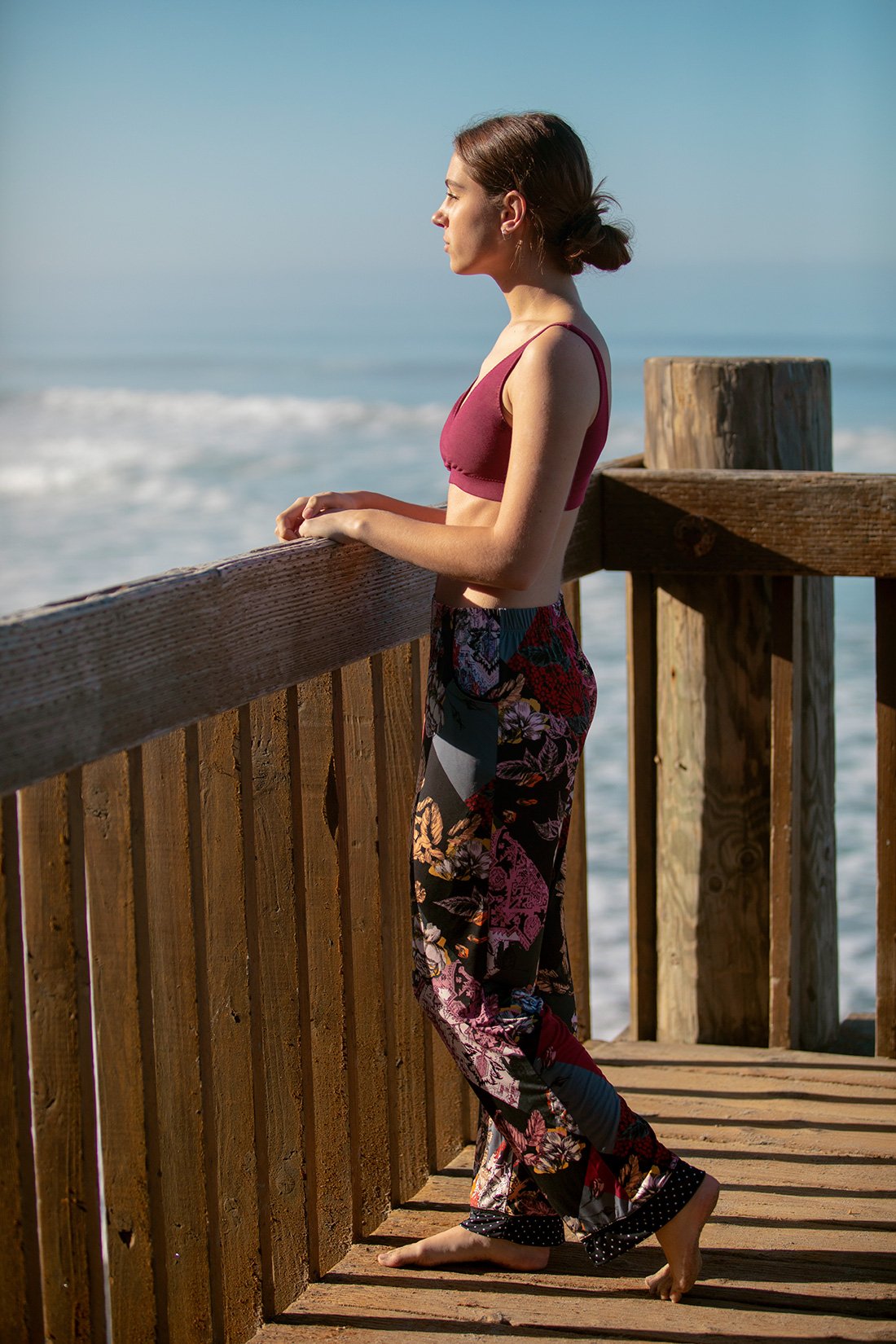Germaine Caprio
By Susan Messer
Germaine Caprio is a long-time supporter of One Earth Collective. She has been a panelist at the film festivals and a volunteer at a number of events. And in-sync with One Earth’s values, she’s also the founder of Majamas Earth, a company committed to “making beautiful clothing that doesn't destroy our beautiful planet.” I’ll get into that in a moment, but first, two relevant definitions.
Majamas Earth Polsino Pants are made from recycled poly/span fibers. The fabric is made and printed without using any water.
· Sustainability. In 1987, a commission of the United Nations defined sustainability as “meeting the needs of the present without compromising the ability of future generations to meet their own needs.”
· Fast fashion. This is the business model of replicating recent trends and high-fashion designs, mass-producing them at a low cost, and bringing them to retail stores quickly while demand is at its highest.
The overall problem with fast fashion is that excessive textile production and consumption are not sustainable in any sense of that word. First, according to the Clean Clothes campaign, the garment industry is one of the largest carbon polluters on Earth, and one of the greatest producers of waste, as three out of five of the 100 billion garments made each year end up in landfill—whether donated or discarded. Moreover, toxic chemicals used to produce those garments pollute the environment, including worker communities. Equally offensive are the conditions for garment workers across the world: excessive hours, forced overtime, lack of job security, poverty wages, denial of trade union rights, sexual harassment, and hazardous workplaces.
But back to Germaine, who knows all of this too well. She launched Majamas Earth in 1999 after designing, patenting, and selling the first nursing tank top to Nordstrom Department Stores. “I thought,” she says, “I could sell one of these to everybody. I dove in, and I wanted to be big, like Lululemon.” So she added other clothing lines, basics for women (including those who are pregnant or nursing), men, and babies. And the business grew.
Fabrics destined for landfill can be reclaimed and used to make beautiful garments, as Majamas Earth did to make this woman’s pullover. The man’s shirt and woman’s skirt are cotton/modal, a cellulose fiber that comes from beechwood trees. It is made using a closed-loop process, meaning the water needed to make it is used again and again to make more modal.
“When I got into the garment world, almost by accident,” Germaine says, “I realized how filthy it is. My mom raised me to think about the planet. She was an environmentalist ahead of her time. My Italian grandfather was a tailor. He made fine suits with natural fibers and silk linings. Clothing that was designed to last. But there I was, contributing to environmental problems by using recycled polyester, which I at first thought was a good thing to do but which, I later learned, adds microplastics to our water. And at the same time, I was constantly looking at our sales numbers—so focused on growth. It was hard on my health, hard on my family.”
She continues. “I wanted to be done with everything, close the business by the end of 2022, but our customers kept us going. Instead of closing, I stopped our wholesale business and said goodbye to Whole Foods Market and other big retailers that were selling my garments. I decided to just sell directly through our site. I have come to realize that bigger is not always better, and staying true to my environmental mission meant I was not destined to be the next Lulu Lemon.”
She focused on organic cotton and a fabric called modal, made from beech trees, manufactured at a mill in California that uses a closed-loop process to recycle water rather than discard it. No pesticides are used on any of the house designs’ textiles, and the people sewing them are paid fair wages.
“Sustainable fabrics cost more than non-sustainable ones, and it's a constant challenge to keep our prices down. We sew in family-run, ethical shops. People who can’t afford groceries can’t afford our stuff—I know that—but people who can afford it need to shift their priorities and carefully consider what they’re buying.”
Majamas Earth Elina Hoodie and Care What You Wear Tank are both made from a blend of cotton/modal, using a closed-loop process to conserve water.
Moving beyond clothing, she mentions, for example, Matter products—compostable bags, storage containers, and tableware. “They cost significantly more than the 100-pack sandwich bags you buy at the grocery store,” she says, “but you are putting your money in the right place.” She also mentions Dirty Labs, which makes a biobased laundry detergent that comes in aluminum containers and that has extended the life of her workout clothes.
“Every business has an impact, including mine. There’s no such thing as pollution-free, waste-free manufacturing. But if you really care about what you wear and your environmental impact, you are going to seek out companies like mine, that are doing everything they can to work toward sustainability.”
To learn more and support Majamas work, go to: https://majamas.com/




